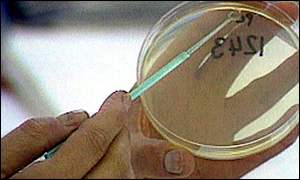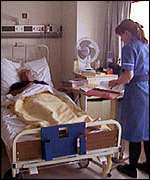
Superbug genetic trigger identified
URL: http://news.bbc.co.uk/hi/english/sci/tech/newsid_1209000/1209443.stm
Date accessed: 15 March 2001
Thursday, 8 March, 2001, 19:02 GMT
A team in the United States has identified how bacteria switch on the genetic machinery that enables bugs to evolve resistance to antibiotics like penicillin.
The discovery raises the possibility of developing pharmaceuticals that will be more effective against infections caused by staphylococci bacteria.
Staphylococci are a family of bacteria that can infect wounds and cause food poisoning.
Complex pathway
The bacteria are a particular problem in hospitals because they rapidly become resistant to antibiotics.

Hospital patients are vulnerable to infection by resistant
strains of bacteria
|
Scientists believe the bacteria become resistant to antibiotics by switching on two genes.
This process is controlled by a complex pathway of signals triggered when penicillin binds to the bacteria.
Drug discovery
A team at the University of California at San Francisco has now identified the chain of reactions that makes up this signalling pathway.
The research, which is published in the journal Science, was carried out by Hong-Zhong Zhang and colleagues.
"Compounds that disrupt this regulatory pathway could restore the activity of b-lactam [penicillin-type] antibiotics against drug-resistant strains of staphylococci," the authors write in the magazine.
"In this way, the machinery that staphylococci have painstakingly acquired to enable them to resist antibiotics will be turned against them," said a commentary on the work in the same publication.